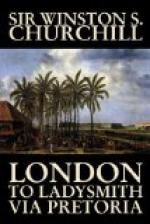But there are also encouraging considerations. We are to make—at least in spite of disappointments we hope and believe we are to make—a supreme effort to relieve Ladysmith. At the same time we are the army for the defence of South Natal. If we had put the matter to the test at Potgieter’s and failed, our line of communications might have been cut behind us, and the whole army, weakened by the inevitable heavy losses of attacking these great positions, might have been captured or dispersed. Here we have the railway behind us. We are not as we were at Potgieter’s ‘formed to a flank.’ We derive an accession of strength from the fact that the troops holding Railhead are now available for the general action.
Besides these inducements this road is the shortest way. Buller, therefore, has elected to lose his men and risk defeat—without which risk no victory can be won—–on this line. Whether he will succeed or not were foolish to prophesy, but it is the common belief that this line offers as good a chance as any other and that at last the army will be given a fair run, and permitted to begin a general engagement and fight it out to the end. If Buller goes in and wins he will have accomplished a wonderful feat of arms, and will gain the lasting honour and gratitude of his country. If he is beaten he will deserve the respect and sympathy of all true soldiers as a man who has tried to the best of his ability to perform a task for which his resources were inadequate. I hasten to return to the chronicle. Hussar Hill—so-called because a small post of the 13th Hussars was surprised on it six weeks ago and lost two men killed—is the high ground opposite Hlangwani and the mountainous ridges called Monte Cristo and Cingolo, on which the Artillery must be posted to prepare the attack. Hence the reconnaissance of the 12th.
At eight o’clock—we never get up early in this war—Lord Dundonald started from the cavalry camp near Stuart’s Farm with the South African Light Horse, the Composite Regiment, Thorneycroft’s Mounted Infantry, the Colt Battery, one battalion of Infantry, the Royal Welsh Fusiliers, and a battery of Field Artillery. The Irregular Horse were familiar with the ground, and we soon occupied Hussar Hill, driving back a small Boer patrol which was watching it, and wounding two of the enemy. A strong picket line was thrown out all round the captured ground and a dropping musketry fire began at long range with the Boers, who lay hidden in the surrounding dongas. At noon Sir Redvers Buller arrived, and made a prolonged reconnaissance of the ground with his telescope. At one o’clock we were ordered to withdraw, and the difficult task of extricating the advanced pickets from close contact with the enemy was performed under a sharp fire, fortunately without the loss of a man.




